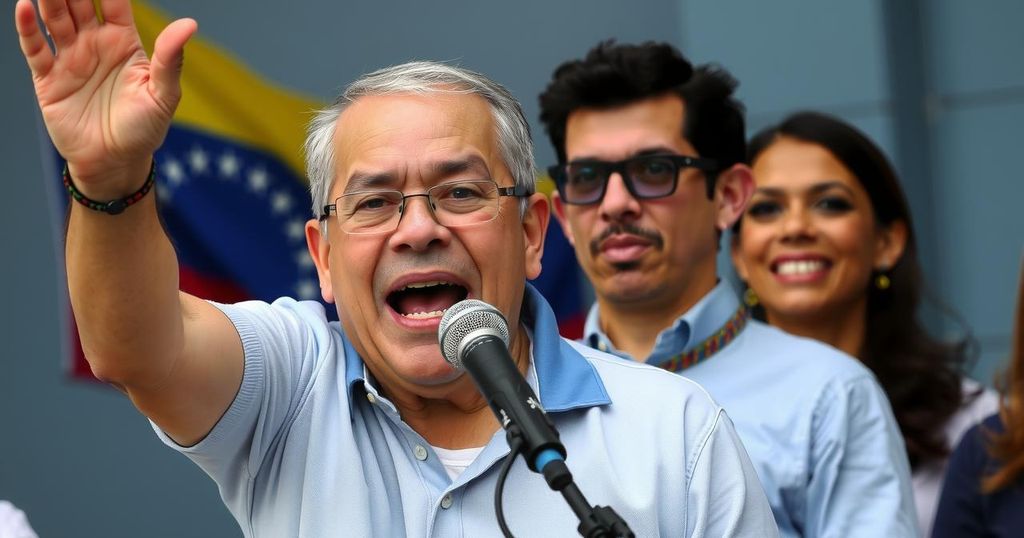Argentina and Brazil Demand Action for Venezuelan Opposition Figures in Crisis

Six Venezuelan opposition figures in the former Argentine embassy are facing heightened harassment as tensions escalate following the disputed July 2024 presidential elections. Argentina, Brazil, and the OAS are advocating for their safe passage amid Maduro’s regime’s ongoing repression. Magalli Meda, one of the opposition members, denounced severe living conditions and infringement on their rights, while Venezuelan officials refute allegations of wrongdoing.
The political crisis in Venezuela is intensifying, as six opposition figures sheltering within the former Argentine embassy in Caracas have reported increasing acts of harassment and repression. These individuals, who sought refuge starting in March 2024, have been subjected to constant surveillance, interruptions of essential utilities, and the alarming arrests of embassy personnel. The severity of the situation has drawn notable concern from regional powers, specifically Argentina and Brazil, as well as the Organization of American States (OAS), all demanding safe passage for these dissenting voices amid ongoing tensions with Nicolás Maduro’s administration.
These opposition figures initially took sanctuary under the auspices of Argentina, before their protective status was transferred to Brazil following the expulsion of Argentine diplomats. However, complications arose when Maduro’s government revoked Brazil’s authority to oversee the compound, exacerbating an already precarious situation. Magalli Meda, an aide to prominent opposition leader María Corina Machado, outlined their desperate circumstances, indicating that they live under the constant threat of surveillance and disruptions. “We are seeing how the process of violating our basic human rights is accelerating. It’s urgent to stop this repression, whether psychological or physical,” she stated.
As tensions mount, the Venezuelan government has dismissed allegations of wrongdoing; Interior Minister Diosdado Cabello branded the accusations as a ‘farce’. This dismissiveness underscores the regime’s broader disregard for international appeals for a resolution. The roots of this conflict can be traced back to the controversial presidential elections held in July 2024, which resulted in competing claims of victory between Maduro and Machado. The official results declared Maduro the victor via a pro-government electoral body, while the opposition argued that authentic vote counts revealed an entirely different outcome, intensifying the political gridlock.
The international community has rallied around calls for action. Argentina has actively sought support from OAS member countries to address the situation of the six opposition shelterers. Brazilian President Luiz Inácio Lula da Silva has also played a mediating role, despite the ongoing challenges posed by the Maduro regime’s reluctance to cooperate. Brazil’s ambassador to the OAS, Benoni Belli, highlighted the importance of upholding diplomatic premises in accordance with international law, even while the on-ground realities indicated tension between legal assurances and actual occurrences.
Overall, the environment surrounding the diplomatic compound remains fraught with uncertainty, exposing the ongoing struggles faced by the Venezuelan opposition against a backdrop of repression. The Maduro administration’s dismissal of external calls and its aggressive stance toward dissent have contributed to increased isolation from the regional community, as well as instilling fears among the opposition figures of further violence and repression.
In conclusion, the situation of the six Venezuelan opposition members sheltering in the former Argentine embassy exemplifies the broader human cost of the ongoing political crisis in Venezuela. The international community, particularly Argentina and Brazil, responds to their plight with urgency, emphasizing the need for coordinated diplomatic efforts to ensure their protection. Amidst a complex web of political turmoil, the future of these individuals—and indeed that of Venezuela—remains precarious, demanding sustained attention from regional and global leaders.
The Venezuelan political landscape has been embroiled in turmoil following disputed presidential elections held in July 2024. Nicolás Maduro, facing claims of fraud, asserted victory amidst a backdrop of deepening political division. A group of six opposition figures has found sanctuary in the former Argentine embassy in Caracas, where they report rising threats and harassment from governmental forces. This has prompted calls from regional countries, namely Argentina and Brazil, for appropriate actions to ensure their safety, showcasing a significant rift between the opposition and the Maduro regime, which regularly dismisses allegations of repression as unfounded.
The ongoing crisis experienced by the six opposition figures in Venezuela highlights the fundamental challenges confronted by dissenting voices under the Maduro administration. The escalating harassment they endure underscores a broader narrative of political repression, emphasizing the urgency for international intervention and support. Argentina, Brazil, and other OAS members must persist in their diplomatic efforts to safeguard these individuals, as their plight epitomizes the need for an urgent resolution to Venezuela’s deepening political strife.
Original Source: www.newslooks.com







